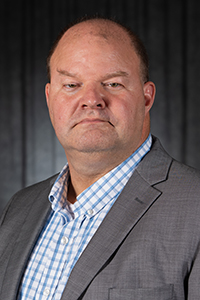
John Ferry is a distinguished professor of chemistry and biochemistry in the UIS School of Integrated Sciences, Sustainability, and Public Health. His research areas include environmental chemistry, toxicology, microbial ecology, and science outreach.
Can you give me a brief timeline of how your career led you to UIS?
I was fortunate to find a high school job in a salvage archaeology lab run by the University of Illinois during the construction of Interstate 255 in the summer of 1984. The archaeology part was fascinating; some estimates give human occupation in that area going back approximately 8,000 years. Even more fascinating to me was why the area was occupied for so long. There is a small, isolated marsh there watered by a spring falling from the bluffs along the Mississippi Valley. The marsh didn’t have a natural drain, making it one of the few examples of a natural salt marsh in Illinois and a rare natural source of salt for the region.
Studying that system and the chemistry that formed it led me to pursue a chemistry degree at the University of Illinois at Urbana-Champaign, matriculating in the fall of 1986. While there, I worked in an environmental chemistry lab run by Prof. Richard Larson and an ecology lab run by Prof. Robert Metcalf. In 1990, I went to pursue graduate work in environmental chemistry under Prof. William Glaze at the University of North Carolina at Chapel Hill. After that, I studied radiation chemistry for two years with Prof. Marye Anne Fox when she was at the University of Texas at Austin. From there, I worked as a professor of environmental chemistry in the chemistry department at the University of South Carolina. Shortly after retiring from that job and moving back home to Illinois, I was fortunate enough to have the opportunity to come to UIS and pitch in to help with the new ISP effort. I am grateful to be here.
What do you love most about your field of study?
It’s fun (at least to me). I like finding new connections between things, and environmental science and chemistry always deliver opportunities to think about and do new things. A common theme in my research over the years has been to try and understand how contaminants disappear from the aqueous environment, meaning different water bodies. Since contaminants change as technology changes, this means there is always something new to look at, and since we live in a water world, there’s always a new place to see it happen.
What are some interesting projects you've been able to work on?
I started environmental research as an undergraduate shortly after the Exxon Valdez oil spill devastated Prince William Sound in Alaska; I didn’t work on that project but did work on a local oil spill that same year on the UIUC campus. Since then, I have worked on problems with chlorinated chemicals and explosives in groundwater, pesticides, and metals in water bodies ranging from the Appalachians to the Atlantic Ocean, microbial toxins in lakes and rivers all over the Southeastern U.S., and lots of other problems. I recently participated in a really fun project where my group was part of the support team when the National Science Foundation sent the submarine ALVIN to a hydrothermal vent field in the Pacific Ocean. In the environmental field, being adaptable means being ready to work with people from different backgrounds, and I have had the pleasure of working with experts in analytical chemistry, free radical chemistry, benthic ecology, microbial ecology, biogeochemical cycles, chemical oceanography, and many other fields.
Do you have any side projects or personal goals you are working on?
My wife and I are trying to renovate an old farm and see if we can make it productive again. We will have been working on the farm project for a year at the beginning of October. It’s really outside our experience as neither of us has ever farmed before. She is a chemical engineer who works on air pollution problems, and I am a distinguished professor of biology and chemistry. Learning all the new skills we need for this project has been a tremendous amount of fun, and we’re really looking forward to the next year.
Getting to Know You is recurring feature in the Chancellor's Newsletter to highlight our many talented UIS employees.